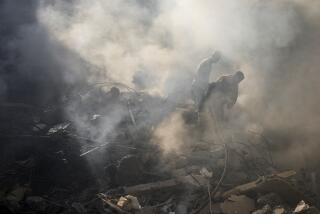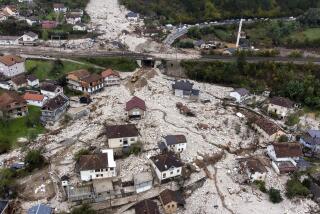Peacekeeper Wounded in Bosnia Dies : Balkans: Bangladeshi was one of five injured in Serbian attack. U.N. officials denounce it as most serious strike against their mission since war began.
ZAGREB, Croatia — A Bangladeshi peacekeeper, his hand severed and his eyes blinded by a missile attack on his armored vehicle in northwest Bosnia, slipped into a coma and died Tuesday at a mobile military hospital here.
His death, and the wounding of four fellow Bangladeshis in the attack Monday, were denounced by U.N. officials as the result of the most serious strike against the U.N. Protection Force since the start of the war in Bosnia-Herzegovina.
“The attack . . . is one of the most flagrant, deliberate and calculated assaults on UNPROFOR to have taken place in the history of this peacekeeping operation,” said U.N. spokesman Michael C. Williams.
But aside from angry talk at UNPROFOR headquarters here and the lodging of official protests with the Bosnian Serbs and their allies, the U.N. mission was at a loss to respond for fear of provoking new attacks against the 23,500 peacekeepers in Bosnia. The Bangladeshi soldier was the 133rd peacekeeper to die in the former Yugoslav federation.
Even the United Nations’ version of saber rattling--calling on the North Atlantic Treaty Organization to deploy warplanes overhead--was deemed too risky a response because of the growing number of antiaircraft missile systems controlled by the Bosnian Serbs. The United Nations estimates that the systems cover 40% of Bosnia, including the airport in the capital, Sarajevo.
A request for NATO air presence was made by the Bangladeshi commander in Bihac in northwest Bosnia, but it was not formally passed on to NATO, U.N. spokesman Paul Risley said. Bad weather, the inability to target the weapons used in the assault and the presence of antiaircraft missile systems contributed to the decision, he said.
“The risk to the pilots is too great,” Risley added.
But a NATO official in Brussels disagreed, saying NATO could have deployed aircraft in the area if the United Nations had asked.
“If this kind of behavior goes on, it is going to weaken the U.N.,” the NATO official said of UNPROFOR’s inaction. “The reputation of the U.N. and U.N. peacekeepers will suffer.”
U.S. Defense Secretary William J. Perry, in Brussels for a NATO meeting, also placed the responsibility on the U.N. command in Bosnia for not responding to the attack on the Bangladeshis. “NATO is ready to react in response to the U.N.,” Perry said.
As the United Nations chose to stand idly by, the embattled Bangladeshi battalion threatened to become a tragic metaphor for the unraveling U.N. presence in Bosnia.
Already without adequate supplies and weapons, the 1,200 peacekeepers were pinned down Tuesday in a bomb shelter near the northwest Bosnian town of Velika Kladusa as Croatian Serbs and Serbian-backed Muslim rebels advanced on the area. U.N. officials said the Serbs from the breakaway Krajina region of Croatia appear intent on overrunning the Muslim farm town, which lies within the U.N.-declared “safe area” around Bihac.
“It looks as if there is a conscious attempt to try and take Velika Kladusa,” Williams said.
Fighting to the south in Bihac also intensified Tuesday, with a mortar shell striking a house in the town center. U.N. officials said the shell was fired by Bosnian or Krajina Serbs and killed a 3-year-old child.
With the war closing in, the Bangladeshi battalion is virtually defenseless. Deployed in early October when France withdrew its troops from Bihac, the Bangladeshis were sent to the then-quiet region with a rifle for every fourth soldier and wearing summer uniforms.
Now they are trapped in the region with a two-week supply of food and a paltry weapons depot that U.N. officials say is insufficient to repel attacks such as the antitank missile assault Monday. Williams conceded on Tuesday that the decision to send the battalion to replace the French was “ill advised.”
“They are in an extremely grave situation,” he said.
The Bangladeshi problems have been compounded by Bangladesh’s lack of clout in a U.N. mission dominated by Europeans. With no Bangladeshi general in the UNPROFOR command, the 1,200 peacekeepers have no strong advocate in Zagreb. By contrast, when Bosnian Serbs attacked a French armored vehicle in September, the United Nations requested--and NATO supplied--an air strike.
The Bangladeshis also have fallen victim to bad timing and waning international resolve.
“In September, the international community was still playing hardball: They thought the Serbs would blink,” one Western diplomat said. “Now we have regular harassment of peacekeepers, some are even taken hostage, and we are back to worrying and hand-wringing.”
Times staff writer Tyler Marshall in Brussels contributed to this report.
(BEGIN TEXT OF INFOBOX / INFOGRAPHIC)
A Collective Force
About 23,500 U.N.-peacekeeping personnel are scattered throughout Bosnia-Herzegovina. Here are the main concentrations:
1) Bihac pocket*: 1,200 Bangladeshi; 67 others
2) Split (in Croatia): 2,011 British; 280 French
3) Mostar: 1,269 Spanish; 2 others
4) Konjic: 1,543 Malaysian
5) Gornji Vakuf: 256 British; 459 others
6) Busovaca: 391 Dutch
7) Zenica: 1,460 Turkish
8) Kakanj: 453 Belgian and French
9) Vares: 1,392 Pakistani
10) Visoko: 862 Canadians
11) Kiseljak: 317 British; 26 others
12) Sarajevo*: 159 Danish; 417 Egyptian; 3,028 French; 505 Russian; 306 Ukranian; 661 Norwegian; 103 Belgian
13) Gorazde*: 250 British; 150 Ukranian
14) Zepa*: 120 Ukranian
15) Srebrenica*: 1,224 Dutch; 9 others
16) Banovici: 1,425 Pakistani
17) Tuzia*: 1,045 Swedish; 200 Pakistani; 121 Danish; 100 Jordanian; 341 others
18) Vitez: 700 British
* U.N.-designated “safe area.”
More to Read
Sign up for Essential California
The most important California stories and recommendations in your inbox every morning.
You may occasionally receive promotional content from the Los Angeles Times.










